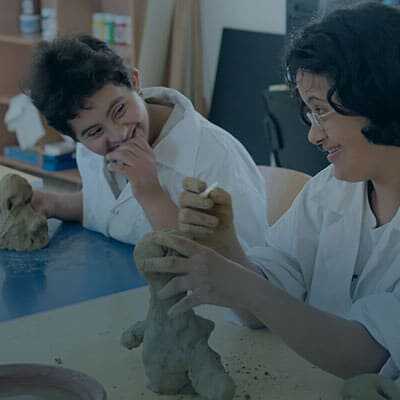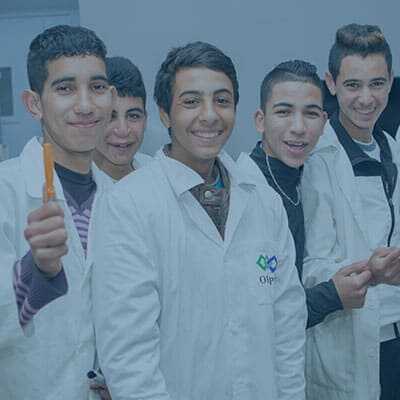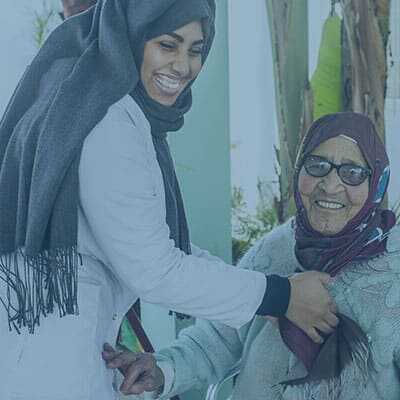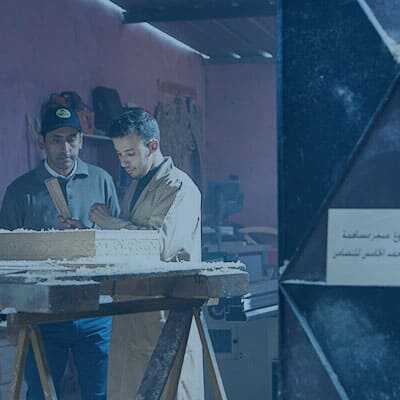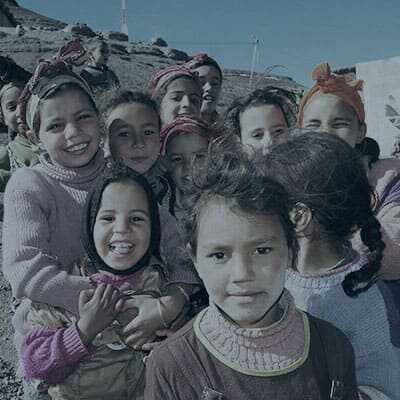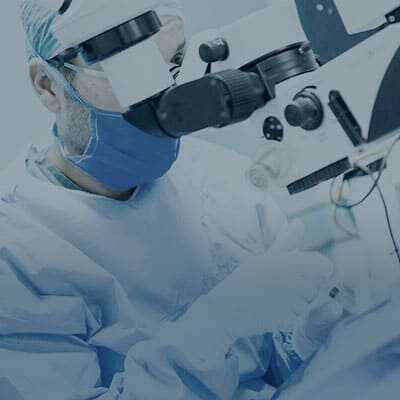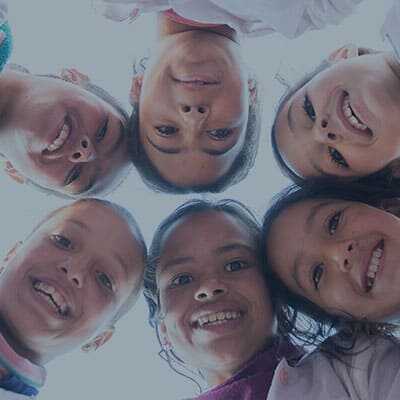Timeline
At the heart of social action since 1998
As Crown Prince, His Majesty King Mohammed VI personally committed to helping those most in need. Many sought to meet him, seeking help. In 1998, He chaired the Ethics Committee, with the support of His late Majesty King Hassan II. This Committee was a multidisciplinary unit designed to boost social and humanitarian action. In the wake of this experience, His Majesty King Mohammed VI was keen to set up a lasting institution to promote human dignity. A foundation was thus born.
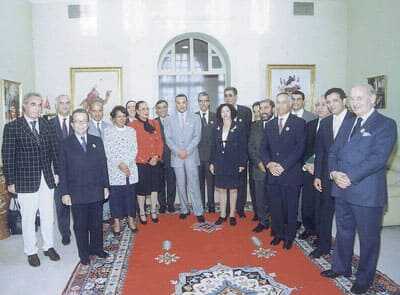
October 1998
The first National Solidarity Campaign
His Majesty King Mohammed VI, then Crown Prince, chaired the Ethics Committee with the support ...His Majesty King Mohammed VI, then Crown Prince, chaired the Ethics Committee with the support of His Majesty King Hassan II. A college of prominent figures oversaw the first collection of public donations.
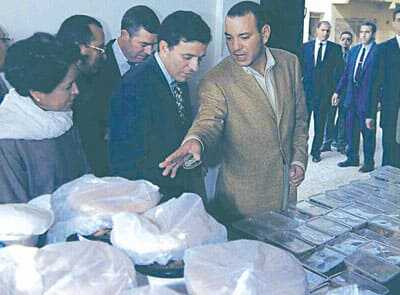
December 1998
Ramadan of the hearts
His Majesty King Mohammed VI, then Crown Prince, supervised an important food support operation ...His Majesty King Mohammed VI, then Crown Prince, supervised an important food support operation. 1 million meals were distributed to the needy during the month of Ramadan.
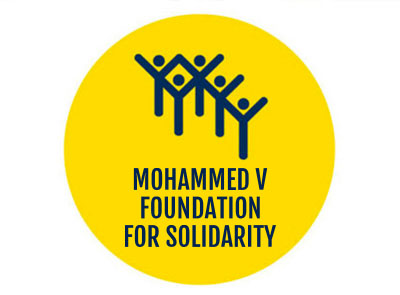
July 1999
Solidarity, a national priority
His Majesty King Mohammed VI created the Mohammed Foundation for Solidarity ...His Majesty King Mohammed VI created the Mohammed Foundation for Solidarity. Recognized as a public entity (Decree issued on 21 Rabie 1st – 5 July 1999), the foundation is committed to fighting poverty and precariousness in collaboration works with government agencies, economic operators and civil society organizations. Its motto is: "Ready to help the needy".
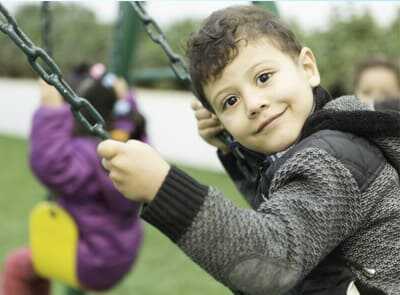
January 2000
Priority to child care
Priority is given to the rehabilitation of centers operated by Muslim charity organizations ...Priority is given to the rehabilitation of centers operated by Muslim charity organizations. The Foundation renovated 91 centers offering free care to children aged 6 to 18. 100 million dirhams were spent over a 2-year period.
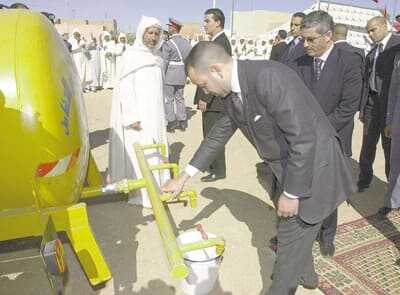
April 2000
National solidarity campaign against the effects of drought
General mobilization and a national wave of solidarity in support of populations ...General mobilization and a national wave of solidarity in support of populations impacted by the effects of drought. The Foundation provides equipment and means for the supply of drinking water. It also participates in the development of water points.
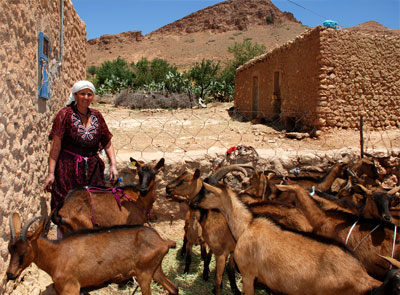
June 2000
The "Sustainable development in rural areas" program
The first large-scale local development actions are started ...The first large-scale local development actions are started. A program for access to basic services and support for the income-generating activities is started in several regions (Chefchaouen, El Haouz, Imilchil, Safi, Taroudant, Tendrara, Tiznit, etc.). It gives priority to handicraft goodsand agricultural production units led by women.
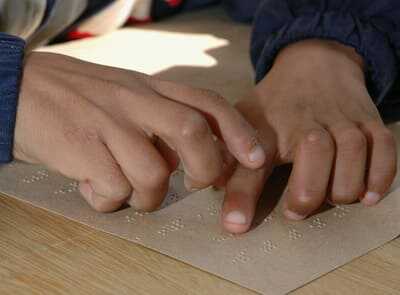
March 2001
Training centers dedicated to the blind
The Foundation is embarking on a major social reintegration program for the visually impaired...The Foundation is embarking on a major social reintegration program for the visually impaired. It is underpinned by three facilities located in the cities of Fez, Meknes and Taroudant.
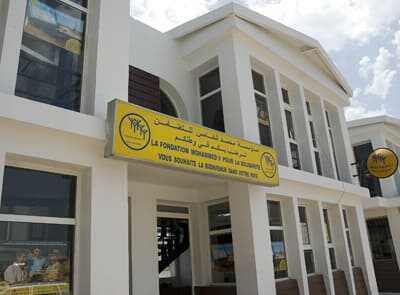
May 2001
The Foundation takes part in the Marhaba operation
A unique humanitarian system is set up to welcome Moroccans residing abroad...A unique humanitarian system is set up to welcome Moroccans residing abroad. A local social assistance and health care system is deployed in Morocco and abroad seven days a week round the clock, throughout the summer period. The aim is to intervene in emergency situations, improve transit conditions and ensure the well-being of nearly one million people during their travel.
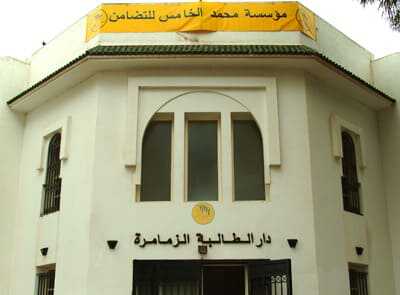
September 2001
Dar Taliba, fighting school dropout
Started in 2000, the Dar Taliba is a residential schools program established in remote rural areas of Morocco ...Started in 2000, the Dar Taliba is a residential schools program established in remote rural areas of Morocco. Its objective is to fight school drop-out among girls in rural areas due to distance from school. The Khémis Zemamra center hosted 100 young residents from neighboring rural communes. Since then, more than 85 homes for young people have been built near elementary schools, high schools and universities. This model has been duplicated by other institutional and private actors.
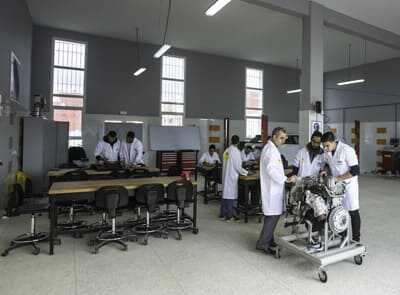
December 2001
Vocational training for young people
Implemented in partnership with the Office of Vocational Training and Employment Promotion, this program ...Implemented in partnership with the Office of Vocational Training and Employment Promotion, this program aims to ensure the socio-professional integration of young people. The first center dedicated to construction-related trades opens in Laayoune.
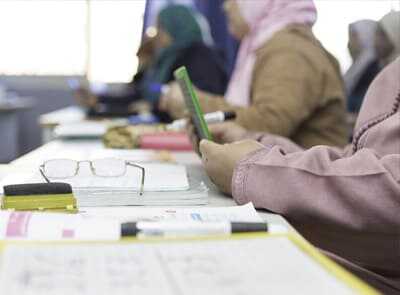
January 2002
Literacy program in rural areas
The Foundation initiated a major project to combat illiteracy...The Foundation initiated a major project to combat illiteracy. It targeted 30,000 adults in the Al Haouz, Al Hoceima and Ait Fasska regions.
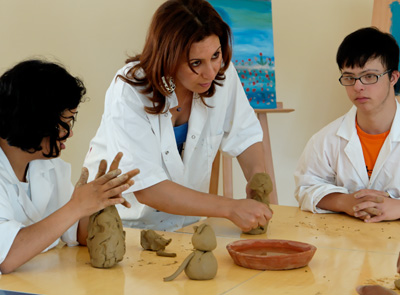
April 2002
Support for organizations dedicated to the disabled
In Khémisset, the Foundation turns the Ibn Al Baytar Center - created in 1972 ...In Khémisset, the Foundation turns the Ibn Al Baytar Center - created in 1972 - into a revamped facility that provides health care for young people with disabilities.
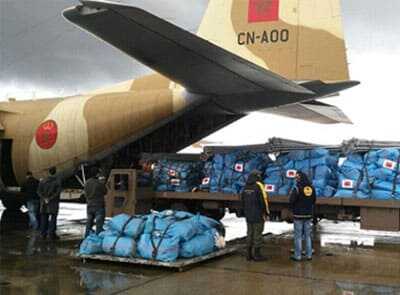
August 2002
First humanitarian mission abroad
An emergency humanitarian mission was organized for victims of severe weather in eastern Algeria ...An emergency humanitarian mission was organized for victims of severe weather in eastern Algeria. Similarly, in Morocco, aid programs are carried out for the benefit of families affected by floods (Middle Atlas mountains, Mohammedia, Settat ...).
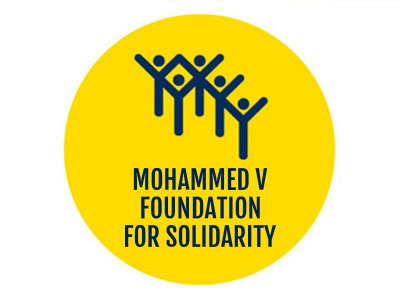
September 2002
Establishment of the Standing Support Committee
The Foundation institutionalizes the network of economic operators and civil society actors ...The Foundation institutionalizes the network of economic operators and civil society actors working alongside it. Composed of about a hundred partners, the Committee provides an annual financial contribution and is directly involved in project implementation.
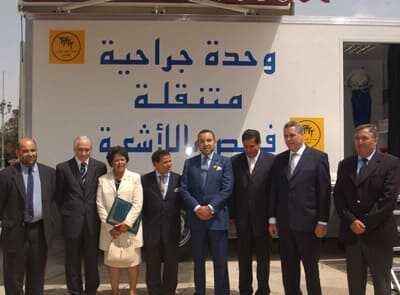
January 2003
Launch of the community medical caravan program
Through multidisciplinary medical caravans, the Foundation prioritizes access to basic health care ...Through multidisciplinary medical caravans, the Foundation prioritizes access to basic health care. These mobile medical units get as close as possible to local populations in rural and peri-urban areas. Health care and medical services are provided free of charge. In 2003, 13 operations were organized benefiting 16,000 people.
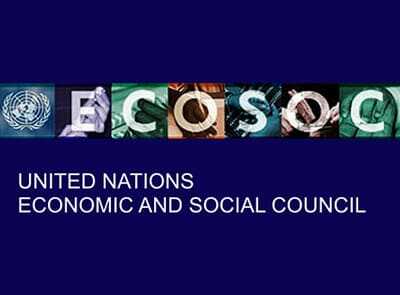
December 2003
ECOSOC Special Consultative Status obtained
The United Nations Council on Economic and Social Affairs pays tribute to the Foundation ...The United Nations Council on Economic and Social Affairs pays tribute to the Foundation after nearly five years of pro-poor action. This special status is an opportunity for the Foundation to share Morocco’s experience and participate in reflections led by ECOSOC.
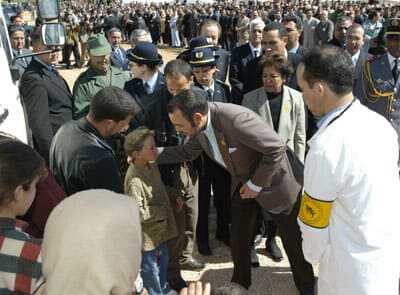
February 2004
Exceptional mobilization in the aftermath of the Al Hoceima earthquake
In the wake of the serious earthquake in Al Hoceima, the Foundation ...In the wake of the serious earthquake in Al Hoceima, the Foundation contributes to disaster relief operations in the Al Hoceima region. Many social and medical rehabilitation projects were also started.

May 2004
A training center for young with motor disabilities
The Center - a first of its kind initiative in Morocco - offers training modules adapted to young people ...The Center - a first of its kind initiative in Morocco - offers training modules adapted to young people with motor disabilities. Since, 10 similar centers have been created across Morocco.
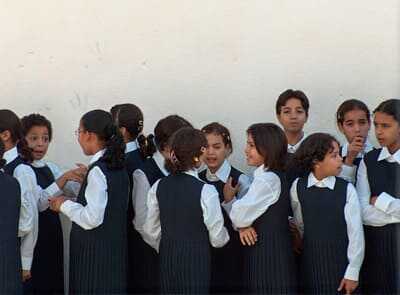
September 2004
‘’Sanabil operation’’, school aid for rural children
The Foundation launches a three-year school-related assistance program involving several institutional actors ...The Foundation launches a three-year school-related assistance program involving several institutional actors. School supplies, warm clothing and food were distributed to 25,000 children in rural areas affected by cold weather.
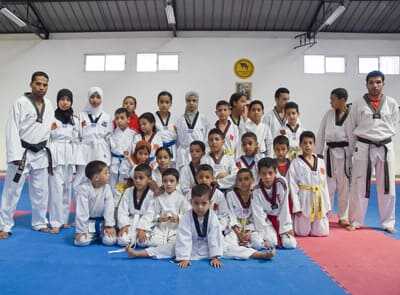
January 2005
Socio-educational integration of young people: a key issue
The Foundation launches an important project of socio-educational and sports facilities ...The Foundation launches an important project of socio-educational and sports facilities. These are neighborhood support and activity centers primarily targeting young people. 150 million dirhams were dedicated to the development of these urban centers throughout Morocco.
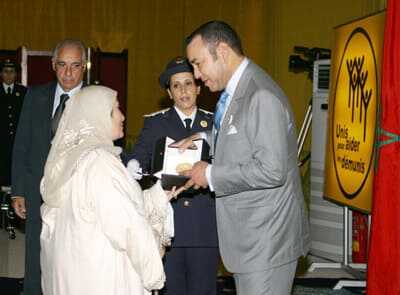
November 2005
A solidarity network for associations
The Foundation and its partner associations set up a regional and local network ...The Foundation and its partner associations set up a regional and local network. The aim is to foster synergy and offer new social solutions.
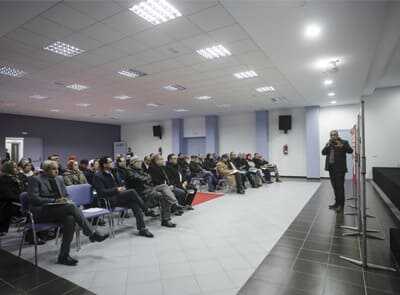
September 2006
Launch of the Social Engineering Program
The Foundation builds new expertise in support of associations ...The Foundation builds new expertise in support of associations. The sharing of know-how, human resource development and capacity building are leveraged to professionalize civil society organizations.
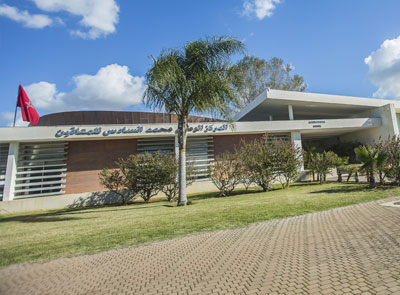
November 2006
Center for the disabled: a national standard-setter
Unprecedented in Morocco, this Center provides integrated, multifunctional care to people with disabilities ...Unprecedented in Morocco, this Center provides integrated, multifunctional care to people with disabilities. As a national reference institution, it also serves as a platform for training and for exchange on disability-related issues.
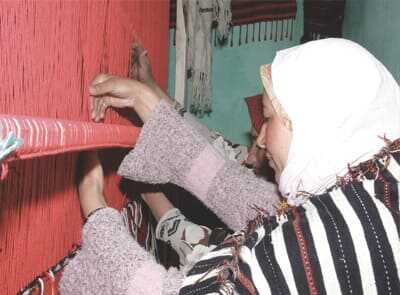
September 2007
Mobilizing for inclusive development in Tounfite
A first-of-a-kind initiative in the country, in terms of scope and nature, ...A first-of-a-kind initiative in the country, in terms of scope and nature, this operation involved a major social program. Including support for schooling, nutrition, medical assistance, employment-generating activities, etc., this program led to the social inclusion of 24,000 people from the Tounfite region.
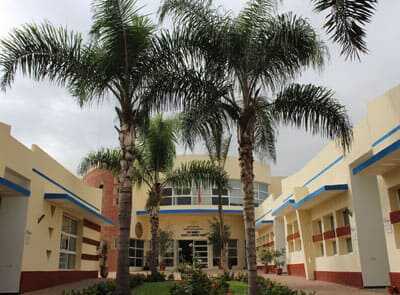
November 2007
New support mechanism for Solidarity-based Microfinance
This innovative institution is dedicated to micro-credit ...This innovative institution is dedicated to micro-credit. The platform supports micro-credit associations as well as project leaders.
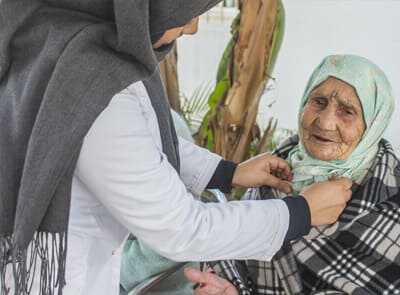
September 2008
Priority to care for the elderly
Located in the Nahda neighborhood in Rabat, the Center is the first initiative aimed at serving elderly people living in precarious conditions ...Located in the Nahda neighborhood in Rabat, the Center is the first initiative aimed at serving elderly people living in precarious conditions. It uses the social emergency services (SAMU social).
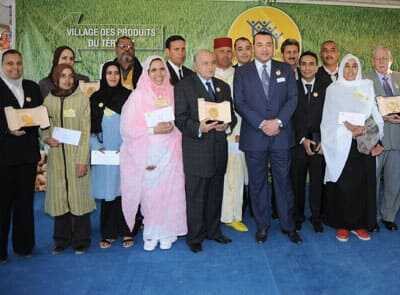
November 2008
A center dedicated to agricultural training
This first-of-a- kind institution aims to train young people in agricultural trades ...This first-of-a- kind institution aims to train young people in agricultural trades. It also provides support to the agricultural sector at the regional level through ongoing training for agricultural workers.
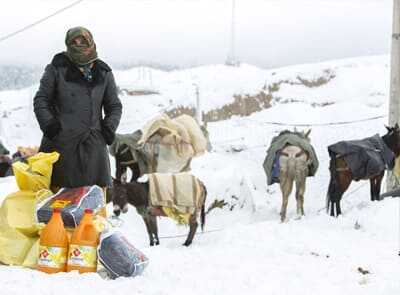
December 2008
First Extreme Cold Operation
A humanitarian assistance and accessibility system is deployed in rural and mountainous areas ...A humanitarian assistance and accessibility system is deployed in rural and mountainous areas. The first interventions are carried out for the benefit of families hard by the cold winter months in the Imilchil and Khénifra regions.
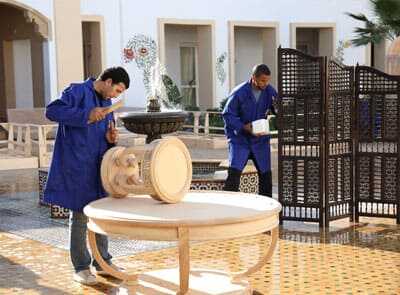
November 2009
Handicraft as a lever for integrating young people
Training in handcraft trades is revamped with a new focus on apprenticeships, ...Training in handcraft trades is revamped with a new focus on apprenticeships, the preservation of age-old heritage and support for integration. An integrated, new generation facility devoted to the handicrafts industry is launched in Fez. In 2012, two other centers are established in Marrakech and Salé.
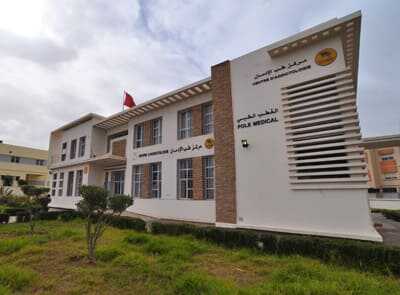
May 2010
A pioneering program to combat addictive behavior
Targeting young people, the Foundation launches a model program to combat the use of drugs ...Targeting young people, the Foundation launches a model program to combat the use of drugs and prevent addictive behavior. It is based on providing medical and social care to young people suffering from addiction.
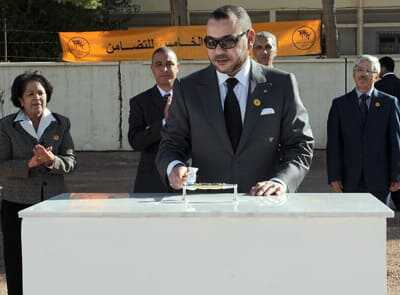
November 2010
A center dedicated to the support of CSOs
His Majesty the King kicks off construction work on The Bouknadel Community Center ...His Majesty the King kicks off construction work on The Bouknadel Community Center. This new platform offers training, coaching and exchange of expertise to associations from across the country.
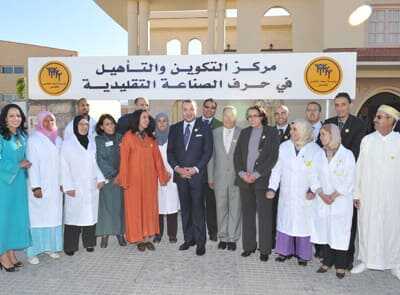
November 2011
Multidimensional solidarity project in Midelt
This is multi-dimensional solidarity project which is fully integrated into the socio-economic fabric ...This is multi-dimensional solidarity project which is fully integrated into the socio-economic fabric of the Midelt region. It revolves around three pillars: training in handicraft trades for young people, supporting local production through assistance to cooperatives and tourism promotion.
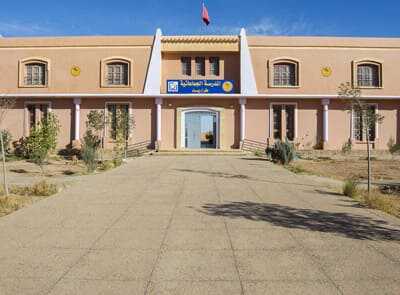
September 2012
Opening of Trarid Community School
The Foundation opened its first community school ...The Foundation opened its first community school. It is attended by children from nomadic families in the Figuig Province.

May 2013
Promoting self-employment among young people
His Majesty King Mohammed VI donates equipment to 100 young entrepreneurs ...His Majesty King Mohammed VI donates equipment to 100 young entrepreneurs. The donations were intended to support various economic projects led by graduates of vocational training centers in Meknes region.
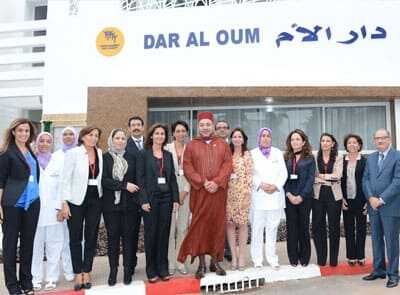
July 2013
Dar Al Oum, accommodation facilities within hospitals
The Foundation provides equipment to a new Social service center for poor people ...The Foundation provides equipment to a new Social service center for poor people. It is intended to accommodate the mothers of children with serious illnesses who are in hospital.
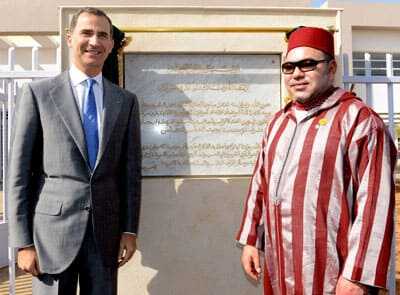
July 2014
New training track dedicated to tourism
His Majesty King Mohammed VI, accompanied by his guest, King Felipe VI of Spain, inaugurates ...His Majesty King Mohammed VI, accompanied by his guest, King Felipe VI of Spain, inaugurates the first Hospitality and Tourism Training Center set up by the Foundation, in Témara. This facility is meant to support the development of a fast-growing priority sector.
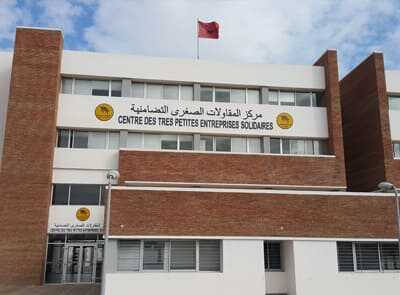
January 2015
A Solidarity-based center for very small enterprises
A new solidarity-based incubation platform is started by the Foundation at Casablanca ...A new solidarity-based incubation platform is started by the Foundation at Casablanca. It aims to support business initiatives by young people from underprivileged backgrounds.
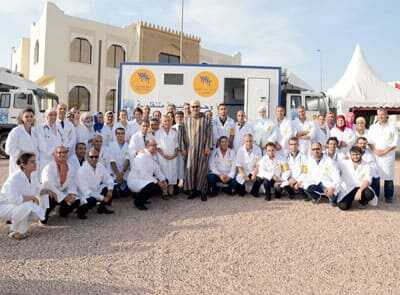
June 2015
First Edition of the Ramadan Medical Campaign
A new community-based medical services system is activated throughout the month of Ramadan ...A new community-based medical services system is activated throughout the month of Ramadan. The campaign visits rural communes in several regions. 24,000 people received free medical care and services.
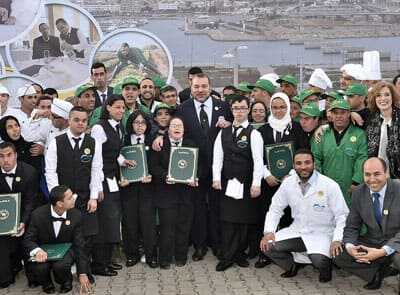
February 2016
CIAT, a pilot project for people with intellectual disabilities
A pilot project, CIAT provides a framework suited to young people with mental disabilities ...A pilot project, CIAT provides a framework suited to young people with mental disabilities who possess professional skills. By enabling them to engage in a gainful activity, the project provides an original response to the marginalization of this segment of the population.
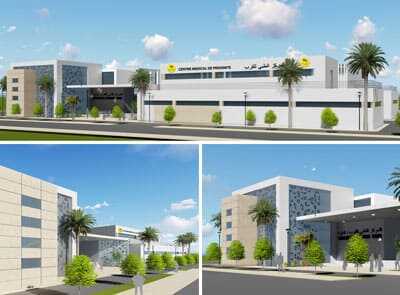
September 2016
A new model of community-based medical facilities
The Foundation introduces a new type of community medical facility ...The Foundation introduces a new type of community medical facility, including a full range of integrated care.
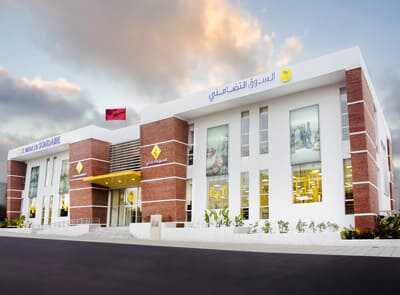
March 2017
The Solidarity Market, an innovative fair-trade project
The Casablanca Solidarity Market - an unprecedented fair-trade project ...The Casablanca Solidarity Market - an unprecedented fair-trade project - paves the way for sustainable distribution of goods producedby Moroccan cooperatives.
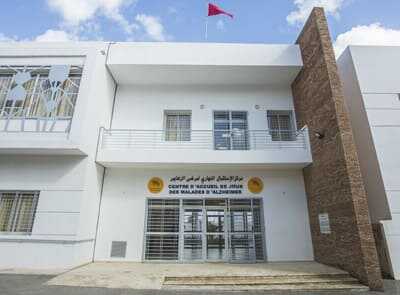
May 2017
The Day Center for Alzheimer's Patients, a first in Morocco
This first-of-a-kind facility in Morocco provides care to patients suffering from Alzheimer's disease ...This first-of-a-kind facility in Morocco provides care to patients suffering from Alzheimer's disease. Care includes medical, social, preventive and curative aspects, in addition to support for caregivers.
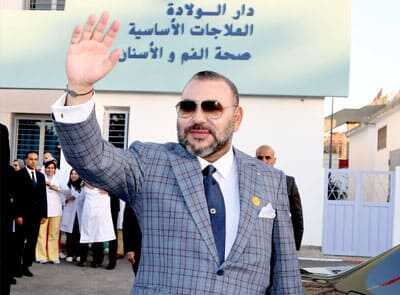
June 2017
A new generation of primary health care centers
His Majesty King Mohammed VI inaugurates a new generation of community medical centers ...His Majesty King Mohammed VI inaugurates a new generation of community medical centers. Medical emergency services and multidisciplinary care, including a mother and child unit, are provided free of charge to deprived populations.
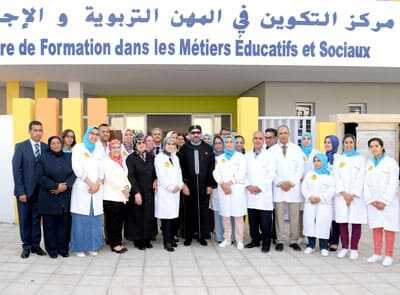
May 2018
First training institution in social and educational occupations
A new solidarity-based project dedicated to social and educational services is born in Rabat ...A new solidarity-based project dedicated to social and educational services is born in Rabat. It enables young people from underprivileged backgrounds to benefit from training leading to qualification and diplomas in attractive occupations, including those of specialized instructor, preschool teacher and social worker.
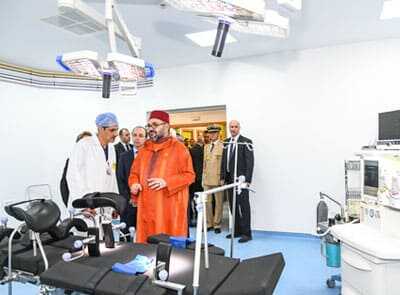
May 2019
Opening of the first Community Medical Center (CMC) – Mohammed V Foundation for solidarity
His Majesty King Mohammed VI launches a new generation ...His Majesty King Mohammed VI launches a new generation of health facilities combining the features of basic health care establishments and the hospital network: the Community Medical Centers – Mohammed V Foundation for Solidarity. The first center, inaugurated in Youssoufia, will benefit 160.000 inhabitants thanks to a comprehensive and integrated specialized care provision, including mainly a maternity hospital, a day hospital and an emergency department.
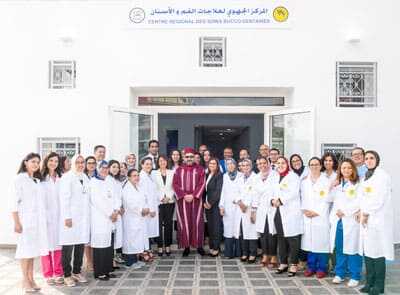
May 2019
A first regional structure for dental care
His Majesty King Mohammed VI inaugurates, in Yaacoub Al Mansour district in Rabat...His Majesty King Mohammed VI inaugurates, in Yaacoub Al Mansour district in Rabat, the Regional Center for Dental Care Al Massira, an innovative structure entirely dedicated to dental health. Medical consultations, generalist and specialist care, surgery and emergency treatments are provided and suitable equipment are available for children and people with reduced mobility.
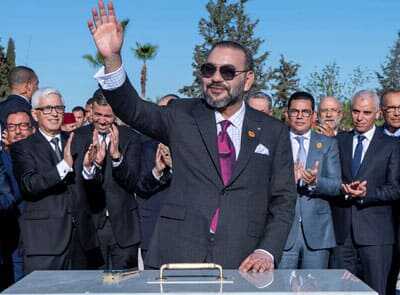
March 2020
Expanding the national coverage of the Community Medical Centers program
His Majesty King Mohammed VI gives a new impetus to the Mohammed V Foundation for Solidarity ...His Majesty King Mohammed VI gives a new impetus to the Mohammed V Foundation for Solidarity - Community Medical Centers Program in Fez, by initiating three new units, two of which are in Fez and one more in Tangier. The program is thus equipped with a platform that now has twelve centers covering the cities of Tangier, Fez, Rabat, Salé, Témara and Casablanca.
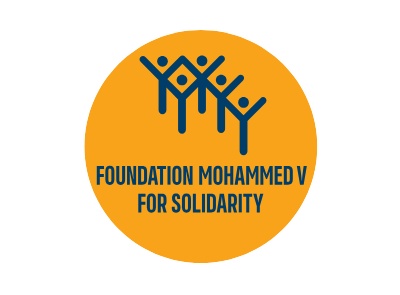
March 2020
Unity in the face of the Pandemic's Effects
Mobilized in support of national efforts to combat the pandemic, the Foundation contributed 10 million dirhams ...Mobilized in support of national efforts to combat the pandemic, the Foundation contributed 10 million dirhams to the special pandemic management fund. Additionally, it launched an extensive support program. This initiative included donations of food supplies, medical products, and equipment for social protection establishments and the Ministry of Health, maintaining services at medical-social centers, as well as implementing exceptional measures to sustain the Ramadan food support and Marhaba operations.
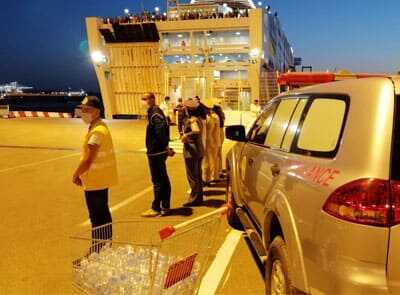
July 2020
Marhaba 2020 Exceptional reception arrangements under the label of health safety
Following the exceptional opening of the national borders allowing the return of Moroccans ...Following the exceptional opening of the national borders allowing the return of Moroccans living abroad, His Majesty King Mohammed VI gave his High instructions for the Marhaba reception arrangements to be implemented. The Foundation has activated 13 of its accompaniment, medical and social assistance sites, for nationals returning by air and sea from France and Italy, in compliance with health safety and social distancing guidelines imposed by the fight against the pandemic.

January 2021
The PAAC: a support framework for local and crafts cooperatives
The Support and Accompaniment Program for Cooperatives, aimed at upgrading ...The Support and Accompaniment Program for Cooperatives, aimed at upgrading and developing the production activities of cooperatives, has entered its operational phase. The program provides comprehensive support over two to three years for eligible centers, including facility design, equipment provision, assistance with obtaining ONSSA approval, organizational and managerial support, technical training, and skills enhancement.

November 2021
A new generation of training centers
A new learning experience has been introduced at the El Hank Center of Training ...A new learning experience has been introduced at the El Hank Center of Training in Hospitality and Tourism Professions in Casablanca. This initiative is based on a hybrid training model based on Swiss standards (VET by EHL). The center employes innovative pedagogical methods with a qualitative focus on soft skills and entrepreneurial expertise. Digital tools are integrated into work processes, learning pathways and training environments.
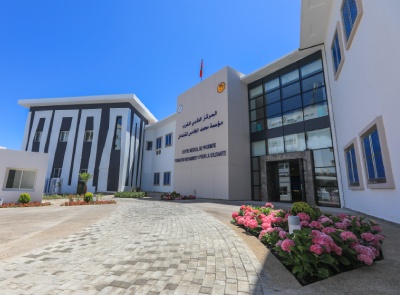
February 2022
New expansion of the CMP network
Three new CMPs have been launched in the cities of Tangier, Témara, and the new city of Errahma.Three new CMPs have been launched in the cities of Tangier, Témara, and the new city of Errahma. These centers will address the healthcare needs of the people in their respective areas, estimated at 500,000, 250,000, and 300,000 inhabitants. This expansion brings the total number of operational CMPs to five since 2019.
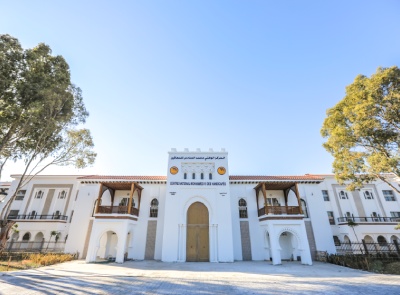
September 2022
Regional development of multidisciplinary support for people with disabilities
Two new regional sections of the CNMH have opened in Tangier and Agadir, ...Two new regional sections of the CNMH have opened in Tangier and Agadir, extending the network's coverage to seven regions. With its eight operational centers, the CNMH continues to strengthen the socio-educational, medical, sports, and professional inclusion of individuals with disabilities year after year.
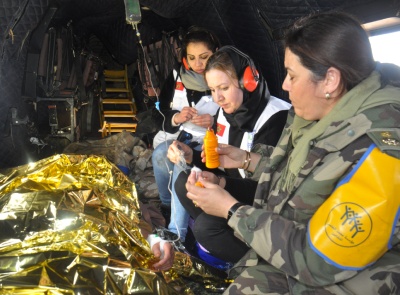
February 2023
High Atlas operation in response to unprecedented snowfalls
An emergency humanitarian intervention was organized in the provinces of Ouarzazate, Zagora, and Taroudant, ...An emergency humanitarian intervention was organized in the provinces of Ouarzazate, Zagora, and Taroudant, which were affected by an intense cold snap (with snowfall of up to 2 meters and negative temperatures). Within a week and with the collaboration of the FAR, the Royal Gendarmerie and relevant departments, a large-scale logistical and medical-humanitarian operation (air bridges, mobile and land distribution of humanitarian aid, medical caravans) was established to assist 24,000 households from 651 villages.
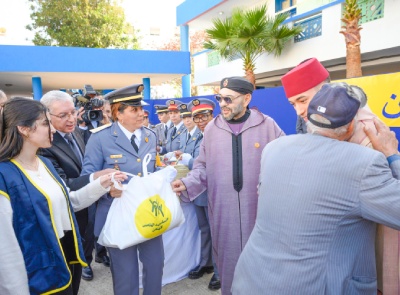
March 2023
Exceptional edition of the Ramadan Operation: one million beneficiary households
The 24th edition of the Ramadan Food Support Operation saw a remarkable increase ...The 24th edition of the Ramadan Food Support Operation saw a remarkable increase of 400,000 additional beneficiary households (compared to 2022), reaching a total of one million households. The food basket was also enhanced with the addition of new products and an increase in the quantities of existing items.
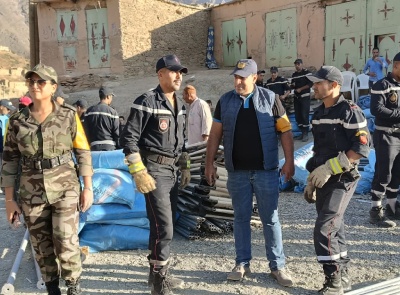
September 2023
National mobilization for the victims of Al Haouz
On the night of September 8-9, a powerful earthquake struck the High Atlas region. Fully mobilized, ...On the night of September 8-9, a powerful earthquake struck the High Atlas region. Fully mobilized, the Foundation participated in the support program for affected populations alongside military and state actors. It activated a comprehensive support mechanism to address the vital needs and security of communities in the provinces of Al Haouz, Chichaoua, and Taroudant. An ongoing program has been established to assist the return to normalcy.
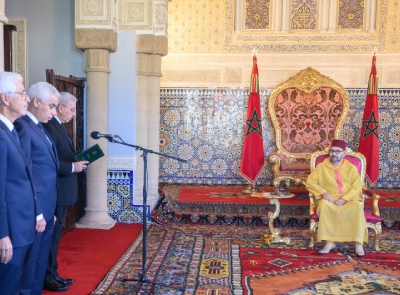
October 2023
A first in Morocco: the Foundation brings connected health services to rural areas
The Connected Mobile Medical Units – Foundation Mohammed V for Solidarity program, ...The Connected Mobile Medical Units – Foundation Mohammed V for Solidarity program, which aims to improve access to medical services in rural areas, is launched in the presence of His Majesty King Mohammed VI. Fifty mobile units will be deployed in remote rural areas, providing the population with continuous healthcare that combines in-person local care and specialized telemedicine.

